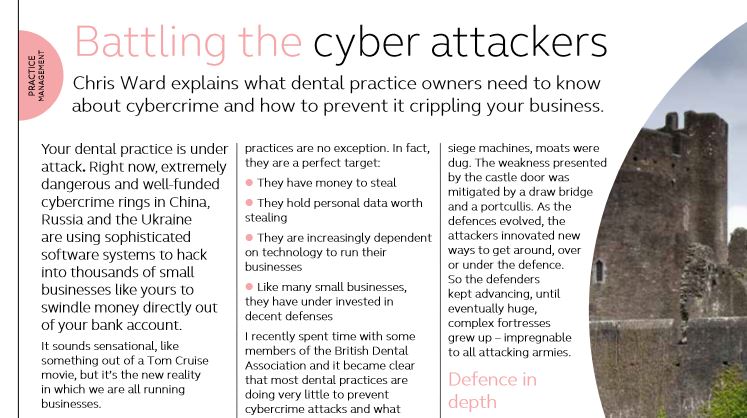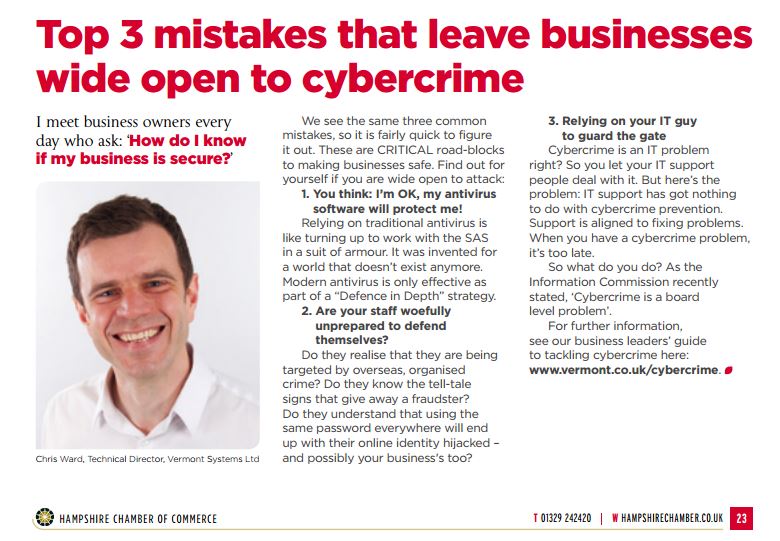What Is Managed IT Services…
And Why Should You Demand It
From Your IT Services Company?

In today’s constantly shifting technological landscape, where fresh viruses and the new security patches designed to protect against them arrive by the week, it takes a proactive approach to stay abreast of all the changes. This is why, in 2019, more small to mid-size enterprises (SMEs) are ditching their outdated break-fix strategies and making the switch to a managed services provider (MSP) for their IT needs. For those still coming to terms with the new rapid-fire reality of business in the digital age, it can be difficult to determine which approach is right for your organisation, or even what a managed services provider actually does. Here’s a breakdown of the managed services strategy versus the traditional break-fix approach and how it applies to your business.
MANAGED SERVICES ARE DESIGNED FOR UP-TO-THE-MINUTE IT UPKEEP.
Maintaining the integrity, efficiency and security of your business network is a little like taking care of your car. You don’t buy the equipment with the expectation that it’ll be good to go forever; you know that it’ll take regular upkeep to stay in tip-top shape. For a car, of course, that means regular servicing, oil changes, rotating the tyres, checking the alignment, checking and replacing the fluids, ensuring correct tyre pressure, changing your spark plugs, flushing the transmission – the list goes on and on. If you don’t bother with basic preventative maintenance of your vehicle, it’ll fail you sooner rather than later. We’re guessing most of you wouldn’t drive 30,000 miles without checking the oil, for instance. Many of these tasks can be taken care of with some savvy and time investment, but others require the expertise of a seasoned professional, especially when serious problems arise.
It’s the same with your network. Business technology is notoriously finicky. It’ll work perfectly for months and, in rare cases, for years – until suddenly it doesn’t, at which point it’s usually too late. Suddenly all your data is locked down behind some nasty new ransomware, or your server decided to give up the ghost without warning, leaving key customer information swinging in the wind. We constantly hear about companies shelling out thousands of pounds for high-profile data breaches, but when these attacks come to SMEs, they often fold the company completely. What was once a thriving small business is now an empty office, buried under the never-ending progress of modern technology.
The old break-fix approach to IT management attempts to address the digital risks facing SMEs only after problems arise. Is your server down? Is malware giving you a headache? Is your email not working for some reason? If so, they’re on the scene. Otherwise, they’re hands-off. The idea behind this strategy is the classic adage “If it isn’t broke, don’t fix it.” Business owners look to cut costs on IT by only addressing the most serious technological crises after they’ve already happened, rather than investing funds for regular preventative maintenance.
Unfortunately, just like how this approach doesn’t make sense in the context of your car, it certainly doesn’t make sense for your network. A break-fix strategy can save money in the short term, but it results in more network downtime, a much higher frequency of issues and a larger proportion of your budget spent on damage control down the line.
Instead, you should demand that the IT professionals responsible for the backbone of your business provide managed services. This means they’re in the guts of your network every day, mastering and locking down every aspect of your technology long before anything goes wrong. They’ll detect issues before they cost you money and fix them without hesitation. You might balk at the initial on-boarding fee, but if you run the numbers, you’ll quickly see how much money it will save you in the long run.
An investment in a MSP is an investment in the future of your business. You wouldn’t drive your car mindlessly until it breaks down; it’s arguably even more dangerous to do the same with your network. Take a proactive approach, demand managed services and breathe a sigh of relief knowing your network is in the hands of professionals well-versed in the ins and outs of your business’s specific needs.
FREE Report: What Every SME Business Owner Must Know About Protecting And Preserving Their Company’s Critical Data

This report will outline in plain, no -technical English the common mistakes that many small-business owners make with their computer networks that cost them thousands in lost sales, productivity and computer repair bills. It will also provide an easy, proven way to reduce or eliminate the financial expense and frustration caused by these oversights.
Download your FREE copy today: www.vermont.co.uk/protect-critical-data/
SHINY NEW GADGET OF THE MONTH: Bringing The Peephole Into The 21st Century: The Ring Door View Cam

As more and more things in the world become digitized and revamped for the smart-phone generation, the humble peephole has joined the ranks of IoT-enabled devices.
Enter the Ring Door View Cam, a nifty little piece of tech that replaces the fish-eye lens of your peephole with a camera so there’s never any question who is at the door. You also get mobile notifications whenever the device’s (adjustable) motion sensor is triggered, enabling remote communication with a visitor from your phone, even if you’re not home. No more missed visitors, packages left with neighbours or late-night encounters with suspicious strangers.
Sound good? Prices start at £89.00 on Amazon.
5 Ways To Answer Questions Like A CEO
by Geoff Smart
In my work as a consultant, I’ve had the privilege of posing questions to 1,000’s of business leaders. As a result, I’ve been on the receiving end of many great answers. Unfortunately, I’ve also heard answers from less-skilled managers.
Here are five ways to correctly answer questions:
1. Answer a yes-or-no question with a “yes” or “no” before you provide details.
Does John Thomas work at Google?
Bad: John Thomas? I knew him back at Cambridge. He and I were at Trinity together. This one time …
Great: Yes. He works at Google now. We went to Uni together, and we’re Facebook friends.
2. Answer a number question with a number answer before you provide details.
How much did your sales decline during the last recession?
Bad: It was a really hard time for us. It felt like we were running a marathon in quicksand. No matter what we did …
Great: Twenty per cent. Fortunately, the compensation of our team was largely variable, so we all made a bit less income during that period and avoided redundancies.
3. Say what your goal was, what you did and what the results were.
What happened in that job?
Bad: Well, it was in Australia. I was not used to Oz. Wow, were the summers humid - and the mosquitoes? Big as birds.
Great: “My mission was to set up a new food bank. The goal was to recruit 20 restaurant partners, hire the first five employees and serve 100 meals a day within three months. Things moved a little more slowly than I was used to, so I had to get creative. We hired a video crew, interviewed restaurant managers and customers and gave free social media advertising to the restaurants if they signed up with us. This allowed us to achieve our goals a month earlier than planned, and my bosses were thrilled!
4. Answer from the other person’s point of view.
Why do you want me to invest in your ice cream van?
Bad: Because we need the capital to grow.
Great: Because 10% return on invested capital is what you say you want, and that is what we have delivered reliably on a per-van basis for over 20 years.
5. Share just enough information to prove your point, but not more.
Why should we buy from your company?
Bad: For starters, here’s our 150-page brochure, a 25-page PowerPoint presentation and a dozen case studies about some companies that are nothing like you.
Great: Three reasons: 1. Gartner group did a survey of our industry and rated us #1 in the three areas that are most important to you. 2. We know this industry better than anybody. Our team published the #1 book on this topic, both in sales and review ratings on Amazon. 3. We offer a 100% money-back guarantee.
The #1 Way Hackers Access Your Network
(And How To Prevent It From Happening)

It’s easy to imagine the hackers attacking your network as a team of computer masterminds. But in reality, the vast majority of data breaches don’t occur from some genius hacking into the mainframe. According to Trace Security, a full 81% of breaches happen as a result of poorly constructed passwords.
Luckily, avoiding this is pretty simple. Ensure every member of your team uses strong passwords, over eight characters in length and comprised of letters, numbers and symbols. Keep the numbers and symbols away from each other, and definitely avoid the common, obvious passwords like “123456789” or “password.” You should also consider implementing two-factor authentication in your system, which is several degrees of magnitude more secure than ordinary passwords, but it can be a headache to set up without an expert on your team.
SmallBizTrends.com, 1/3/2019
THERE IS ONE THING THAT SEPARATES SUCCESSFUL
PEOPLE FROM EVERYONE ELSE
Steve Jobs was a notoriously exacting boss. He constantly held himself to the highest standards of business and creativity and drove himself, and those around him, to greatness. But in his own words, one of his greatest strengths wasn’t the quality of his mind, but his strength of belief. As he put it, “You can’t connect the dots looking forward; you can only connect them looking backward. So, you have to trust that the dots will somehow connect in your future. You have to trust in something – your gut, destiny, life, karma, whatever. This approach has never let me down, and it has made all the difference in my life.”
Of course, he’s not talking about faith in some divine purpose; he’s talking about faith in your own ability to make things work. Instead of developing some “perfect” master plan where every detail is accounted for, we always have to work with imperfect information and step into uncharted territory. Being comfortable with this, according to Jobs, is one of the biggest secrets to success.
Inc.com, 1/2/2019
Ways To Live Well And Sanely In Crazy Times
There’s no discounting the fact that we’re living through some crazy times. With political upheavals, game-changing social media movements and chaotic world events, there’s a lot going on.
- Don’t add to the craziness. Be civil to those with whom you disagree.
- Separate fact from opinion.
- Act with integrity even when others don’t.
- Slow down. You accomplish more of real importance by slowing down.
- Eat slower.
- Get enough sleep. Lack of sufficient sleep is a major influence on poor health.
- Limit your news intake. Be informed, but not inundated.
- Exercise. It’s as simple as that.
- Try and have deeper conversations with friends. Go beyond, “How’s it going?”
- Count your blessings every day. To be precise, list at least three.
- Spend less than you earn.
- Live intentionally. Be specific about what you want to accomplish each day.
- If you can’t take action to deal with something, don’t worry about it. If you can, then do it and stop worrying!
Are You Looking For Engaging And Educational Content For Your Website, Event or Trade Journal? Or Looking At Other Joint Venture Opportunities? Vermont are very happy to work with like minded local businesses
As an expert in his field and award-winning speaker, Chris Ward, Technical Director of Vermont Systems is frequently asked to present at events, participate in media interviews and provide articles for publication. His presentations are both educational and entertaining – a perfect mix to keep your audience engaged.
Sample Articles:

Would your audience benefit from learning more? If you have any requirements for speaking engagements or article submissions, please contact: kirsty.cartwright@vermont.co.uk
or call 023 8098 3405 to discuss how we can help.
At Vermont we are passionate about helping to educate local business leaders.

Sign Up To Receive Our Monthly Newsletters

"At all stages Vermont has remained in close communication, tackling any problems cheerfully and efficiently"
Running an investment specialist IFA needs complex integration of numerous databases and systems...Richard Palmer, Senior Planner Murdoch Asset Management

"We've set ourselves ambitious plans for business expansion through 2019 and are confident that Vermont will provide their support and guidance to help us achieve them"
This is a long-term relationship offering long-term benefits all round.Sarah Kay, Office Manager Turbo Service International
